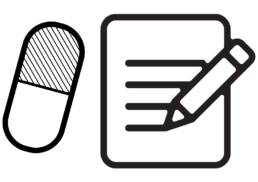Research
Focal points, projects and publications
As a scientific co-operation project checkit! is not only an information and advice centre, but is also active in research. The insight into the current market situation, which is made possible by analysing samples provided, is unique and provides the basis for harm reduction interventions that can react quickly to the latest developments and trends. Direct contact with clients and the collection and evaluation of anonymised data (e.g. questionnaires) also enable the early identification of new consumption trends or market changes.

Focal points
Our current focal points in research are
- Ecstasy: Development of the composition of ecstasy tablets over the past 20 years
- New and recently consumed psychoactive substances
- Evaluation of the new services: Inpatient drug checking and drug checking via pharmacies.
- Ketamine: Enantiomer separation of ketamine (racemate, S-ketamine, R-ketamine)

Projects
Ongoing projects
Interview study "Risk reduction in substance use"
Together with MedUni Vienna, we are conducting an interview study with people about their substance use and the accessibility of drug checking services. To this end, we conducted interviews in 2024 with drug checking clients and people who have never used drug checking services. The aim was to find out whether and what measures are taken to reduce the risk of consumption and what role drug checking plays or could play in this. In addition, the question of how accessible existing services are and what barriers exist for consumers was investigated. Publication of the results is planned for the end of 2025.
Evaluation Drug Checking: Before and after study
A survey on the influence of drug checking on consumption and safer use behaviour with a pre-post design in event settings and inpatient drug checking was launched in mid-2024. The survey will end in March 2025 and the results are planned to be published at the end of 2025 / beginning of 2026.
TEDI (Trans-European Drug Information) project
TEDI is a network of European harm-reduction orientated drug checking facilities that share their expertise and analysis data for the purpose of comprehensive monitoring. To this end, a joint database has been developed in which the data is shared and stored and which enables it to be analysed. The TEDI project was funded by the European Commission from 2011 to 2013. Thanks to the cooperation with the EMCDDA (European Monitoring Centre for Drugs and Drug Addiction), the TEDI network has been building a new database since 2017. The extent to which data is (or can be) shared varies between the participating organisations. www.tedinetwork.org
Publications in connection with the project:
- TEDI (2024). Drug Checking services as an answer to shifting drug markets - The Context Driving the Need for Drug Checking Services (DCS)
- TEDI (2022). TEDI's methodological guidelines
- Vrolijk, R. Q., Measham, F., Quesada, A., Luf, A., Schori, D., Radley, S.,Acreman, D., Smith, J., Verdenik, M., Martins, D., Cunha, M., Paulos, C.J., Fineschi, P., Gerace, E., Karden, A., Koning, R., Smigt-Rigter, L., & Ventura, M. (2022). Size matters: comparing the MDMA content a nd weight of ecstasy tablets submitted to European drug checking services in 2012-2021. Drugs, Habits and Social Policy, 23(3), 207-219.
- Oomen, P. E., Schori, D., Tögel-Lins, K., Acreman, D., Chenorhokian, S., Luf, A., Karden, A., Paulos, C., Fornero, E., Gerace, E., Koning, R.P.J., Galindo, L., Smit-Rigter, L. A., Measham, F. & Ventura, M. (2022). Cannabis adulterated with the synthetic cannabinoid receptor agonist MDMB-4en-PINACA and the role of European drug checking services. International Journal of Drug Policy, 100, 103493.
- Giné, C. V., Vilamala, M. V., Measham, F., Brunt, T. M., Bücheli, A., Paulos, C., Valente, H., Martins, D., Libois, B., Tögel-Lins, K., Jones, G., Karden, A. & Barrett, M. (2017). The utility of drug checking services as monitoring tools and more: A response to Pirona et al. International Journal of Drug Policy, 45, 46-47.
- Brunt, T. M., Nagy, C., Bücheli, A., Martins, D., Ugarte, M., Beduwe, C., & Ventura Vilamala, M. (2017). Drug testing in Europe: monitoring results of the Trans European Drug Information (TEDI) project. Drug testing and analysis, 9(2), 188-198.
NEWNet (Nightlife Empowerment and Wellbeing)
NEWNet is a European network of organisations and NGOs active in health promotion, prevention and nightlife, nightlife professionals, local authorities, medical/therapeutic professionals and researchers. The NEW Net emerged from the Nightlife Empowerment and Well-being Implementation Project (2011-2013). www.safernightlife.org
East-West co-operation
Since the beginning of 2017, there has been a long-term "East-West" research cooperation between checkit! and the Drug work Z6 in Innsbruck. checkit! and Drug work Z6 offer analysis-based counselling in eastern and western Austria. The aim of the cooperation is to research the use and structures of services based on previous data, to exchange expertise at a national level, to ensure quality, to further develop the services and to increase the comparability of the data.
Publications as part of the co-operation:
Trends & Info 2025: Ketamine / Trends & Developments 2025: Ketamine
Trends & Info 2023: XTC Punisher
LSD Info 2022: Incorrect dose information for LSD trips: results of a survey / LSD Infos 2022: False information about the LSD-dose on blotter: survey results
Trends & info 2021: Extender in cocaine; counterfeit XANAX tablets
COVID-19 survey (2020): Results of the survey
Completed projects
EU project: SCANNER
Investigating the development and consequences of the use of new psychoactive substances in the face of a constantly changing (online) drug market.
In the last decade, an increasing number of new psychoactive substances (NPS) have been identified in Europe, for which there is often little information on consumption, consumption patterns and profiles. In addition, laboratory analysis is often difficult because, for example, reference material or chemical spectra are not available.
As part of this project, the extent to which information on the substance identity of NPS offered online corresponds to the actual and proven substance identity will be analysed. Reference analysis methods will be developed and validated and the substances will be analysed by the participating laboratories in a round robin test. In addition, heroin samples from across the EU will be analysed to determine the extent to which fentanyl has penetrated the European heroin market.
In collaboration with all participating drug checking organisations, a comprehensive review of their practices and analytical methods will be carried out, resulting in a report with recommendations and guidelines for governments or authorities planning to introduce drug checking to improve public health safety in relation to drugs in the EU in the future.
Publications in connection with the project:
Balcaen, M., Ventura, M., Gil, C., Luf, A., Martins, D., Cunha, M., Tögel-Lins, K., Wolf, D., Blanckaert, P., & Deconinck, E. (2023). Challenges in drug surveillance: strengthening the analysis of new psychoactive substances by harmonising drug checking services in proficiency testing. International journal of environmental research and public health, 20(5), 4628.
EU project: NEWIP - Nightlife Empowerment & Well-being Implementation Project (2011-2013)
You can find more information about this EU project at: www.safernightlife.org
EU project: Democracy, Cities & Drugs I & II (2005-2011)
You can find more information about this EU project at: www.democitydrug.org
EU project: Effects of pill-testing programmes on the consumption behaviour and risk awareness of ecstasy users
checkit! took part in a study on the effectiveness of secondary prevention measures together with Drobs Hannover and Jellinek Amsterdam in 2001/2002. The purpose of the study was to empirically test the drug policy approach of harm minimisation and risk reduction for the target group of synthetic drug users. A summary of the results can be found here.
EU Project: Pill-Testing Interventions in the EU
On behalf of the European Monitoring Centre for Drugs and Drug Addiction (EBBD) checkit! a compilation of all European projects that offer drug checking and information or plan to include these services in their programme. To this end, we compiled a comprehensive questionnaire and sent it to all European organisations known to us. Representatives of these organisations were invited to Vienna to discuss possibilities for closer cooperation. Further information can be found here.
EU project: SecuCities
In autumn 1999 and spring 2000 checkit! participated in the SecuCities-Drugs project. The aim of this EU project - in which ten different European capitals took part - was a transnational exchange of experience: what can those responsible for major events (e.g. raves, clubs, Love Parades), i.e. organisers, security staff, drug information projects, doctors, paramedics, law enforcement and others, do to make these events safer for visitors. As part of this project, a two-day meeting was also held in Vienna with representatives from the areas listed above.

Publications
Drug Checking Annual Reports
Drug Checking Annual Report 2024 / English version - Annual Report 2024
Drug Checking Annual Report 2023 / English version - Annual Report 2023
Drug Checking Annual Report 2022
Drug Checking Annual Report 2021
Drug Checking Annual Report 2020
Drug Checking Annual Report 2019
Book chapter
Luf, A., Karden, A., Schubert-Kociper, K. & Schmid, R. (2019). Integrated Drug Checking - Methodological Aspects and Implementation of Analysis-Based Interventions. In K. Tögel-Lins, B. Werse & H. Stöver (Eds.), Checking Drug Checking. Frankfurt am Main: Fachholschulverlag Frankfurt a.M. Der Verlag für angewandte Wissenschaft
Grabenhofer, S., Kociper, K., Nagy, C., Luf, A., & Schmid, R. (2018). Drug checking and on-site education in low-threshold prevention work. In Handbook on psychoactive substances (pp. 327-338). Springer, Berlin, Heidelberg.
Kudlacek, O. & Hofmaier, T. & Luf, A. & Stockner, T. & Nagy, C. & Holy, M. & Freissmuth, M. & Schmid, R. & Sitte, H. (2017). Cocaine Adulterants and Effects on Monoamine Transporters. In V. Preedy (Ed), The Neuroscience of Cocaine (pp.59-68). Academic Press.
Peer-reviewed publications
Kudlacek, O., Senning, N., Karden, A., Ludwig, I., Bicher, J., Kooti, F., Holy, M., Stockner, T., Luf, A. & Sitte, H. H. (2025). Health Risks of Cocaine Adulteration: Local Anaesthetics as Modulators of Monoamine and Organic Cation Transporters. Frontiers in Pharmacology, 16, 1699035.
Karden, A., Fragner, T., Feichtinger, C., Strizek, J., McDermott, D. T., & Grabovac, I. (2025). Utilisation of drug checking services in Austria: a cross-sectional online survey. Harm Reduction Journal, 22(1), 1-11.
Balcaen, M., Ventura, M., Gil, C., Luf, A., Martins, D., Cunha, M., Tögel-Lins, K., Wolf, D., Blanckaert, P., & Deconinck, E. (2023). Challenges in drug surveillance: strengthening the analysis of new psychoactive substances by harmonising drug checking services in proficiency testing. International journal of environmental research and public health, 20(5), 4628.
Vrolijk, R. Q., Measham, F., Quesada, A., Luf, A., Schori, D., Radley, S., Acreman, D., Smith, J., Verdenik, M., Martins, D., Cunha, M., Paulos, C.J., Fineschi, P., Gerace, E., Karden, A., Koning, R., Smigt-Rigter, L., & Ventura, M. (2022). Size matters: comparing the MDMA content a nd weight of ecstasy tablets submitted to European drug checking services in 2012-2021. Drugs, Habits and Social Policy, 23(3), 207-219.
Powder, B., Riedel, J., Westphal, F., Luhn, S., Schönberger, T., Schäper, J., Auwärter, V., Luf, A. & Pütz, M. (2022). A new synthetic cathinone: 3, 4-EtPV or 3, 4-Pr-PipVP? An unsuccessful attempt to circumvent the German legislation on new psychoactive substances. Drug Testing and Analysis, 15(1), 84-96.
Oomen, P. E., Schori, D., Tögel-Lins, K., Acreman, D., Chenorhokian, S., Luf, A., Karden, A., Paulos, C., Fornero, E., Gerace, E., Koning, R.P.J., Galindo, L., Smit-Rigter, L. A., Measham, F., & Ventura, M. (2022). Cannabis adulterated with the synthetic cannabinoid receptor agonist MDMB-4en-PINACA and the role of European drug checking services. International Journal of Drug Policy, 100, 103493.
Strizek, J., Karden, A., & Matias, J. (2021). Relevance of cryptomarkets, characteristics of purchasers and possibilities for survey research: experience from the European Web Survey on Drugs. Drugs and Alcohol Today, 21(2), 102-111
Wadowski, P. P., Giurgea, G. A., Schlager, O., Luf, A., Gremmel, T., Hobl, E. L., … & Koppensteiner, R. (2019). Acute limb ischaemia after intake of the phenylethylamine derivative NBOMe. International Journal of Environmental Research and Public Health, 16(24), 5071.
Brunt, T. M., Nagy, C., Bücheli, A., Martins, D., Ugarte, M., Beduwe, C., & Ventura Vilamala, M. (2017). Drug testing in Europe: monitoring results of the Trans European Drug Information (TEDI) project. Drug testing and analysis, 9(2), 188–198.
Kudlacek, O., Hofmaier, T., Luf, A., Mayer, F. P., Stockner, T., Nagy, C., Holy, M., Freissmutz, M., Schmid, R. & Sitte, H. H. (2017). Cocaine adulteration. Journal of Chemical Neuroanatomy, 83, 75–81.
Mayer, F. P., Luf, A., Nagy, C., Holy, M., Schmid, R., Freissmuth, M., & Sitte, H. H. (2016). Application of a combined approach to identify new psychoactive street drugs and decipher their mechanisms at monoamine transporters. In Neuropharmacology of New Psychoactive Substances (NPS) (pp. 333–350). Springer, Cham.
Ostermann, K. M., Luf, A., Lutsch, N. M., Dieplinger, R., Mechtler, T. P., Metz, T. F., Schmid, R. & Kasper, D. C. (2014). MALDI Orbitrap mass spectrometry for fast and simplified analysis of novel street and designer drugs. Clinica Chimica Acta, 433, 254–258.
Hofmaier, T., Luf, A., Seddik, A., Stockner, T., Holy, M., Freissmuth, M., Ecker, G. F., Schmid, R., Sitte, H. & Kudlacek, O. (2014). Aminorex, a metabolite of the cocaine adulterant levamisole, exerts amphetamine-like actions at monoamine transporters. Neurochemistry International, 73, 32–41.
Rosenauer, R., Luf, A., Holy, M., Freissmuth, M., Schmid, R., & Sitte, H. H. (2013). A combined approach using transporter-flux assays and mass spectrometry to examine psychostimulant street drugs of unknown content. ACS chemical neuroscience, 4(1), 182-190.
Eggerth, A., Keller-Ressel, M., Lachout, S., & Schmid, R. (2005). Types of recreational drug users in Austria. Addiction, 51(2), 88–96.
Further publications
Karden, A., & Strizek, J. (2022). The potential for using web surveys to investigate drug sales through cryptomarkets on the darknet. Monitoring drug use in the digital age: Studies in web surveys, EMCDDA Insights. www.emcdda.europa.eu/publications/insights/web-surveys/potential-web-surveys-investigate-drug-sales-cryptomarkets-darknet_en.
Kriener, H., Billeth, R., Gollner, C., Lachout, S., Neubauer, P., & Schmid, R. (2001). An inventory of on-site pill-testing interventions in the EU. Vienna: European Monitoring Centre for Drugs and Drug Addiction.
